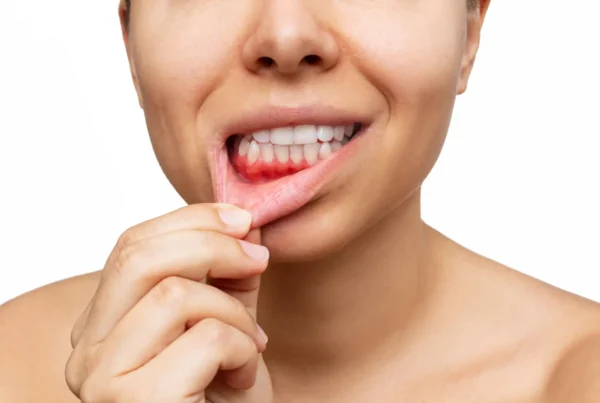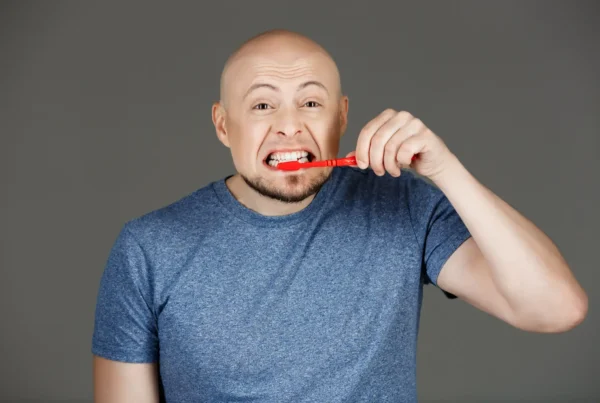- Most common causes of toothache radiating to the ear. Why should you pay special attention to this symptom in children?
- What are the common symptoms of pain radiating from the tooth to the ear?
- Home remedies for tooth pain radiating to the ear and temple – how to relieve it?
- When should you see a specialist?
- How to prevent dental pain?
- Summary
Ear pain, although often associated with infection, can also originate from dental problems. The nerves connecting different areas of the face and head make the radiation of tooth pain to the ear a relatively common phenomenon. How can you recognize this issue and what can you do to help yourself? Let’s find out.
Most common causes of toothache radiating to the ear. Why should you pay special attention to this symptom in children?
Ear pain linked to dental issues is common due to the close anatomical relationship between the oral cavity and the ear, as well as their shared nerve pathways. Special attention should be paid to ear pain caused by a baby tooth in children, as it may be more difficult to diagnose.
Oral inflammation as a cause of toothache radiating to the ear
One of the main causes is radiating pain associated with problems in the jaw or lower jaw. The nerves that innervate the teeth are connected with the nerves near the ear, which is why tooth pain or inflammation in the mouth is often felt as ear pain.
Acute pulpitis
Another cause is oral infections such as advanced tooth decay or acute pulpitis, which often results in inflammation that spreads to nearby tissues, including the ear area and even the alveolar bone. Dental abscesses, especially those located deep within the periodontium, can lead to complications such as abscesses of baby teeth or purulent inflammation of tissues around the molars in the jaw.
Temporomandibular joint disorders and Costen’s syndrome
Problems with the temporomandibular joint may indicate Costen’s syndrome. Malocclusion, bruxism, trauma, or excessive jaw muscle tension can cause joint dysfunction, which often leads to radiating pain to the ear area and may indicate temporomandibular joint disorder.
Wisdom teeth as a source of radiating pain
Wisdom teeth are often responsible for pain that spreads to the ear or jaw. Due to their location, they can put pressure on adjacent tissues and nerves, causing jaw pain and discomfort in the ear. Muscle tension caused by prolonged pain or stress can intensify these symptoms, affecting both the mouth and ear region.
READ MORE: Seven myths about oral hygiene
What are the common symptoms of pain radiating from the tooth to the ear?
Symptoms may include local tooth pain, either constant or throbbing, heightened sensitivity to temperature or touch, and radiating pain to the ear or temple. Swollen, red gums, pain when biting, and increased jaw muscle tension are also common. Difficulty opening the mouth, general malaise, fever, and an unpleasant taste or smell in the mouth can signal a serious issue. Increased gum bleeding or pus discharge may indicate a significant infection.
Home remedies for tooth pain radiating to the ear and temple – how to relieve it?
Rinsing the mouth with warm salt water can help reduce swelling and act as an antiseptic. Cold compresses applied to the cheek help reduce swelling and pain. Over-the-counter pain relievers like ibuprofen or paracetamol may ease symptoms. Avoiding irritating foods and applying clove oil to the affected tooth area can bring temporary relief. Sleeping with the head elevated and applying a warm compress to the ear can also help. Avoid chewing on the painful side and try to minimize stress to reduce discomfort.
When should you see a specialist?
Prolonged or worsening pain, swelling, fever, or discharge from the gums require a visit to the dentist. If pain radiates to the neck, temple, or head, or if you have difficulty opening your mouth, it’s essential to seek professional care. A dentist may refer you to an ENT specialist or oral surgeon for comprehensive treatment.
How to prevent dental pain?
Maintain proper oral hygiene by brushing twice a day with fluoride toothpaste, using dental floss, and mouthwash. Avoid excess sugar and acidic foods. Visit the dentist every six months for check-ups and cleanings. For bruxism, use protective mouthguards. A diet rich in calcium and vitamin D supports healthy teeth and bones.
Summary
Ear pain caused by dental issues results from nerve connections between the mouth and ear, making it hard to pinpoint the exact source of pain. Prompt diagnosis and professional treatment such as root canal therapy, tooth extraction, or infection management are crucial. While home remedies may offer temporary relief, regular oral hygiene, a balanced diet, and dental check-ups are essential to prevent recurring pain that radiates from the tooth to the ear.






